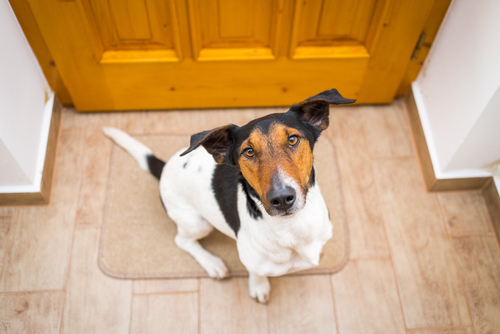We are all familiar with a dog’s response when the door bells ring. Some dogs really flip out, but all dogs react in some way to the sound. Have you ever really considered why that is?
Much like Pavlov’s dogs who associated the sound of a bell with being fed, your dog knows the sound of the doorbell represents a change. Pavlov’s bell made the dogs salivate in anticipation of feeding and the doorbell sound is a learned association for your dog. The doorbell chime probably elicits a rush of adrenaline because it has been associated with the arrival of someone new.

Your dog doesn’t know if this new entry is a threat to the family group or a really good thing, like a friend or food delivery, but dogs are wired to live in a family group and since the sound of the doorbell signifies the addition of a new entity, your dog instinctively knows that all the pack members want to be alerted.
Whether or not she is afraid or excited, she gets a rush of adrenaline. She might be calling for backup or feel it is her responsibility to defend the family or she might be overwhelmed with joy because she loves company. The hormone rush drives her to act. The very first time she heard it, it may have passed unnoticed, but it surely did not take her long to know what it meant.
Related: 10 Best Dog Doors

A dog that is afraid of new people will be very hard to desensitize to the doorbell sound. Sometimes you can replace the “flip out” with a calmer reaction through patient training, but you will always get some sort of reaction to a doorbell once your dog associates it with a new arrival. Remember to reward behavior that you prefer, like sitting or lying down. You can even arm your guests with high value food rewards and have them ask your dog to sit. Never inadvertently reward a freak out by trying to talk her out of barking and never ever punish her. Punishment makes things worse because it adds more fear to the mix. Reward only when she is quiet and calm. If the behavior is truly an issue for you, consider consulting a veterinary behaviorist for a behavior modification plan.
If you like learning about why dogs do things, follow me on Facebook by clicking here.
 Toledo, United States.
Toledo, United States.